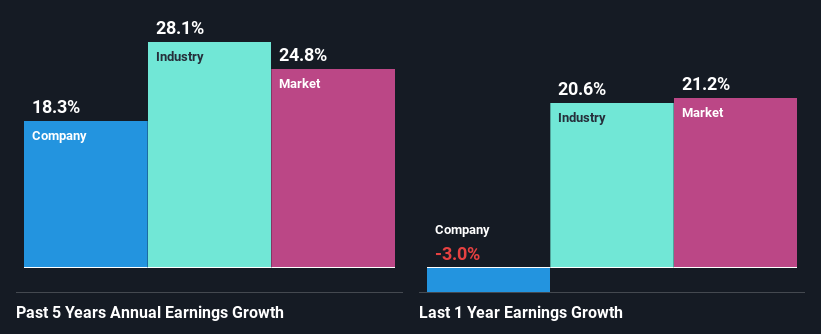- India
- /
- Electronic Equipment and Components
- /
- NSEI:REDINGTON
Redington Limited's (NSE:REDINGTON) Recent Stock Performance Looks Decent- Can Strong Fundamentals Be the Reason?
Most readers would already know that Redington's (NSE:REDINGTON) stock increased by 9.5% over the past three months. Since the market usually pay for a company’s long-term financial health, we decided to study the company’s fundamentals to see if they could be influencing the market. Particularly, we will be paying attention to Redington's ROE today.
Return on equity or ROE is a key measure used to assess how efficiently a company's management is utilizing the company's capital. In simpler terms, it measures the profitability of a company in relation to shareholder's equity.
Check out our latest analysis for Redington
How To Calculate Return On Equity?
Return on equity can be calculated by using the formula:
Return on Equity = Net Profit (from continuing operations) ÷ Shareholders' Equity
So, based on the above formula, the ROE for Redington is:
15% = ₹12b ÷ ₹79b (Based on the trailing twelve months to September 2024).
The 'return' is the profit over the last twelve months. So, this means that for every ₹1 of its shareholder's investments, the company generates a profit of ₹0.15.
Why Is ROE Important For Earnings Growth?
Thus far, we have learned that ROE measures how efficiently a company is generating its profits. We now need to evaluate how much profit the company reinvests or "retains" for future growth which then gives us an idea about the growth potential of the company. Assuming all else is equal, companies that have both a higher return on equity and higher profit retention are usually the ones that have a higher growth rate when compared to companies that don't have the same features.
A Side By Side comparison of Redington's Earnings Growth And 15% ROE
To start with, Redington's ROE looks acceptable. Further, the company's ROE compares quite favorably to the industry average of 11%. This probably laid the ground for Redington's moderate 18% net income growth seen over the past five years.
As a next step, we compared Redington's net income growth with the industry and were disappointed to see that the company's growth is lower than the industry average growth of 28% in the same period.

Earnings growth is an important metric to consider when valuing a stock. What investors need to determine next is if the expected earnings growth, or the lack of it, is already built into the share price. This then helps them determine if the stock is placed for a bright or bleak future. Is Redington fairly valued compared to other companies? These 3 valuation measures might help you decide.
Is Redington Making Efficient Use Of Its Profits?
With a three-year median payout ratio of 40% (implying that the company retains 60% of its profits), it seems that Redington is reinvesting efficiently in a way that it sees respectable amount growth in its earnings and pays a dividend that's well covered.
Besides, Redington has been paying dividends for at least ten years or more. This shows that the company is committed to sharing profits with its shareholders. Our latest analyst data shows that the future payout ratio of the company is expected to drop to 32% over the next three years. As a result, the expected drop in Redington's payout ratio explains the anticipated rise in the company's future ROE to 20%, over the same period.
Summary
Overall, we are quite pleased with Redington's performance. Particularly, we like that the company is reinvesting heavily into its business, and at a high rate of return. As a result, the decent growth in its earnings is not surprising. On studying current analyst estimates, we found that analysts expect the company to continue its recent growth streak. Are these analysts expectations based on the broad expectations for the industry, or on the company's fundamentals? Click here to be taken to our analyst's forecasts page for the company.
New: AI Stock Screener & Alerts
Our new AI Stock Screener scans the market every day to uncover opportunities.
• Dividend Powerhouses (3%+ Yield)
• Undervalued Small Caps with Insider Buying
• High growth Tech and AI Companies
Or build your own from over 50 metrics.
Have feedback on this article? Concerned about the content? Get in touch with us directly. Alternatively, email editorial-team (at) simplywallst.com.
This article by Simply Wall St is general in nature. We provide commentary based on historical data and analyst forecasts only using an unbiased methodology and our articles are not intended to be financial advice. It does not constitute a recommendation to buy or sell any stock, and does not take account of your objectives, or your financial situation. We aim to bring you long-term focused analysis driven by fundamental data. Note that our analysis may not factor in the latest price-sensitive company announcements or qualitative material. Simply Wall St has no position in any stocks mentioned.
About NSEI:REDINGTON
Redington
Distributes information technology, mobility, and other technology products in India, the Middle East, Turkey, Africa, and South Asian countries.
Excellent balance sheet average dividend payer.
Similar Companies
Market Insights
Community Narratives



